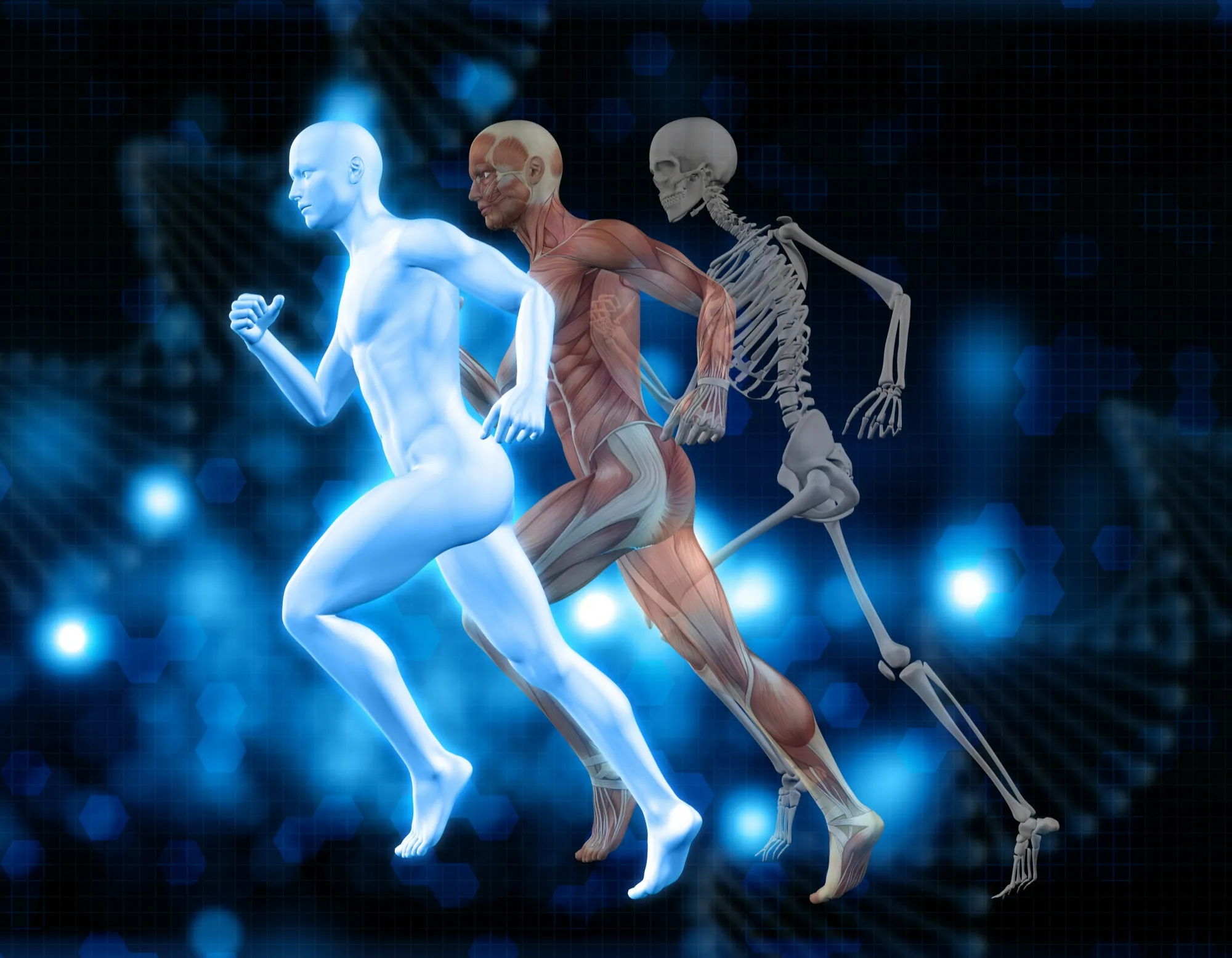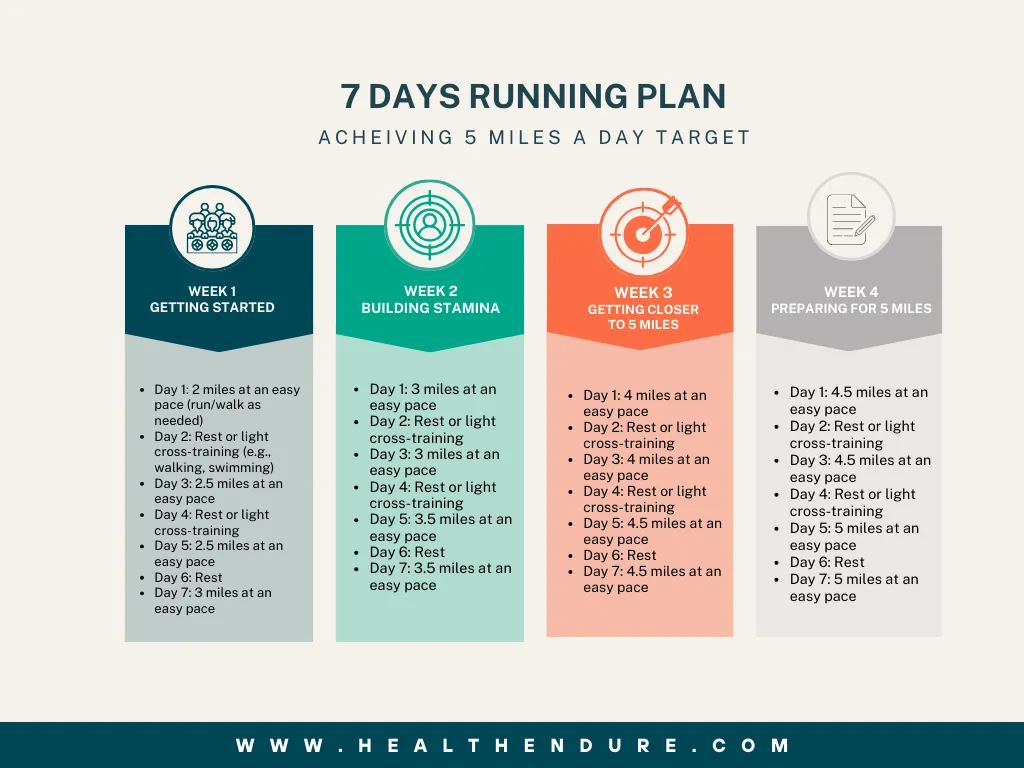Running 5 miles a day is a popular goal for those seeking to lose weight fast, improve cardiovascular health, or maintain an athletic lifestyle. Whether you’re looking to burn calories, boost endurance, or experience the mental benefits of running for stress relief, this daily routine offers a wide range of health advantages.
Not only can running 5 miles a day help with weight management, but it also promotes muscle toning, enhances energy levels, and supports mental clarity. For those wondering, “How many calories do you burn running 5 miles a day?”—the answer can vary based on your weight and speed, but it’s a highly effective way to shed pounds and improve your overall fitness journey.
In this article, we’ll explore the many benefits of running 5 miles daily, different running techniques, and the best tips for starting or improving your 5-mile routine.
How Long Does it Take to Run 5 Miles?
If you’re new to running and wondering about the time commitment needed for a 5-mile run, don’t worry. On average, it takes 40 minutes to an hour to complete a 5-mile run, but the time can vary depending on your fitness level and pace. Remember, you can achieve your running goals with consistent effort and determination. Keep pushing forward, and trust in your ability to succeed.
Practical Approach: Start at a pace that feels comfortable for you, focusing on the joy of the run. Gradually increase intensity as your stamina builds.
Choosing the Best Track for Running
When deciding where to run, it’s essential to choose the best track that suits your goals and environment. Many runners wonder, “Is it better to run outside or on a treadmill?” Both options have their advantages, and the choice largely depends on personal preference and convenience.
Outdoor Running
Running outdoors offers the benefit of fresh air, exposure to nature, and varying terrain that challenges your muscles differently than a treadmill. Whether you’re running on a park trail or through your neighborhood, outdoor running can enhance your cardiovascular endurance and provide a sense of freedom. However, it’s important to prioritize safety—wear reflective gear, choose well-lit areas, and be mindful of traffic if you’re running in urban settings.
Treadmill Running
For those who prefer a controlled environment, treadmill running offers the ability to adjust speed, incline, and distance, making it easier to track progress and stick to a consistent routine. Treadmills are particularly helpful for running in bad weather or when you need a more cushioned surface to reduce joint impact. Additionally, treadmill running can support indoor training when prepping for races or long-distance running events.
Whether you prefer the natural benefits of outdoor running or the convenience of a treadmill, both methods can help you meet your fitness goals and boost your running performance.
Magical Benefits Of Running 5 Miles A Day
Burn Calories and Lose Weight

Regular Running 5 miles a day can help you burn around 300-400 calories. This number can vary depending on how fast you run and your weight. A 150-pound person can torch approximately 550-750 calories during a 5-mile run. The heavier you are, the more calories you will burn.
You can increase your speed or add hills to your run to maximize your calorie burn. This will help you to burn more calories in the same amount of time.
It’s not enough to run 5 miles; you must also keep your diet in check. It’s important to remember that to lose weight, you need to burn more calories than you consume. You must also factor in your basal metabolic rate (BMR) when calculating how many calories you must consume daily. You can calculate your calories burn while running here.
Recent research has substantiated that running incurs a higher energy expenditure than walking, regardless of whether on a track or a treadmill.
Strengthening The Bones

Running a routine of 5 miles a day is not just great for your cardiovascular health; it also plays a crucial role in strengthening your bones. As a weight-bearing exercise, running puts stress on your bones, which stimulates the formation of new bone tissue and increases bone density. This process helps to prevent bone loss and reduces the risk of osteoporosis.
Key Benefits of Running for Bone Health
- Bone Health Support: To maximize the benefits, ensure you get enough calcium and vitamin D, which are essential for bone strength and overall health.
- Increased Bone Density: Regular running encourages your body to build and maintain strong bones, which is vital for preventing conditions like osteoporosis.
- Reduced Risk of Falls and Fractures: By strengthening your bones and improving balance and coordination, running can help decrease the likelihood of falls and fractures.
In research, the American College of Sports Medicine advises engaging in weight-bearing endurance activities, including activities with jumping elements like tennis and jogging, for three to five sessions weekly. Additionally, incorporating resistance exercises two to three times per week is recommended to maintain optimal bone health during adulthood.
Mental Health and Stress Management

Running 5 miles a day offers significant benefits for mental health and stress management. Engaging in regular aerobic exercise like running has been shown to effectively reduce stress and anxiety levels.
Key Mental Health Benefits of Running:
- Stress Reduction: Running triggers the release of endorphins, often referred to as the body’s natural mood enhancers. These endorphins can help mitigate feelings of stress and anxiety, providing a natural boost to your mood.
- Improved Mood and Self-Esteem: Regular running can elevate your mood and enhance self-esteem. It fosters a sense of accomplishment and well-being, contributing to a more positive outlook on life.
- Effective Depression Management: Running can be an effective tool in managing depression. The rhythmic nature of running and the endorphin release can act as a natural antidepressant, helping to alleviate symptoms.
Incorporating a 5-mile running routine into your daily schedule not only improves physical fitness but also offers powerful mental health benefits. For added mental well-being, consider combining running with other stress-relief techniques such as mindfulness or yoga.
In addition, running can help to improve concentration and cognitive function, which can be beneficial for people who suffer from anxiety. A Study also endorsed this concept in 2020. (Psychiatria Danubina, 2020; Vol. 32, Suppl. 2, pp 233-235)
Improve Cardiovascular Health

Running 5 miles a day is an excellent way to boost your cardiovascular health and lower the risk of serious heart conditions. Engaging in this daily aerobic exercise can have a profound impact on your heart and overall circulatory system.
Key Cardiovascular Benefits of Running:
- Stronger Heart Muscle: Consistent running strengthens the heart muscle, improving its efficiency and endurance. A stronger heart can pump blood more effectively, enhancing overall cardiovascular function.
- Reduced Risk of Heart Disease: Regular running significantly decreases the risk of cardiovascular diseases such as heart attacks and strokes. By improving circulation and reducing arterial plaque, running supports a healthier heart.
- Lower Blood Pressure: Running helps in managing and reducing high blood pressure, which is a critical factor in preventing heart disease.
- Improved Cholesterol Levels: Running can help to lower bad cholesterol (LDL) and increase good cholesterol (HDL), contributing to a healthier lipid profile.
Weekly Running Plan For 5 Miles A Day

Starting a weekly running routine to conquer a 5-mile distance can be stimulating and rewarding. A well-structured running plan tailored to your pace and goals ensures steady progress and makes running both achievable and enjoyable. Let’s explore a weekly running program to help you succeed on the road or treadmill.
Maximizing Your 5-Mile Run
Which Food To Avoid Before Running 5 Miles A Day
- Legumes: Beans, lentils, and chickpeas are fiber-rich but can cause bloating and gas.
- High-Fat Foods: Greasy or fried foods take longer to digest, which can result in sluggishness and cramping.
- Spicy Foods: Spices can irritate your stomach and lead to acid reflux during exercise.
- Sugary Snacks: Foods high in refined sugar can cause a rapid energy spike followed by a crash, leading to fatigue.
- Dairy Products: Milk, cheese, and yogurt may trigger bloating or stomach discomfort for some runners.
- Alcohol and Energy Drinks: These can dehydrate you and affect your energy levels, making it harder to stay hydrated during the run.
- Oily and Fatty Foods: These are difficult to digest and can cause discomfort during longer runs.
For optimal performance before running 5 miles a day, stick to lighter, easily digestible options like low-GI meals. A simple snack such as an apple with peanut butter or a banana can provide a good mix of carbohydrates and protein without causing an upset stomach. Also, remember to stay hydrated by drinking plenty of water to prevent dehydration during your run.
How to Motivate Yourself for Running?
Motivating yourself to run 5 miles a day can be a challenge, but a few tips and tricks can help you stay motivated to hit your goal.
- Make sure to have a goal more significant than any race, such as a personal best time or a new distance.
- Change the structure of your runs to keep them interesting, such as incorporating sprints or hills.
- Track your progress and set a 4-6 week training challenge for yourself.
- Listen to something different than your usual running soundtrack.
- Have a challenge to conquer, such as a 5K or 10K race. Get the running gear you love and make sure it fits properly.
- Join a real-life or virtual run club for extra motivation and accountability. Visualize yourself achieving your running goal and make that image a part of your daily routine.
- Finally, give yourself a break and return another day if you’ve hit a wall.
Conclusion
Running 5 miles daily is a great way to get in shape, stay healthy, and boost your mood. It can help you lose weight, build muscle, and improve cardiovascular health. Moreover, it can also help reduce stress and improve your overall mental health.
If you want to get started, find a good running route and start by running 1-2 miles at a time. Once you’ve built up your endurance, you can begin to run 5 miles a day. Remember to focus on increasing your speed and adding hills to your run. This will help you to burn more calories and improve your fitness level.
So, what are you waiting for? Unlock the fitter and healthier you by running 5 miles a day!
Share this content:




